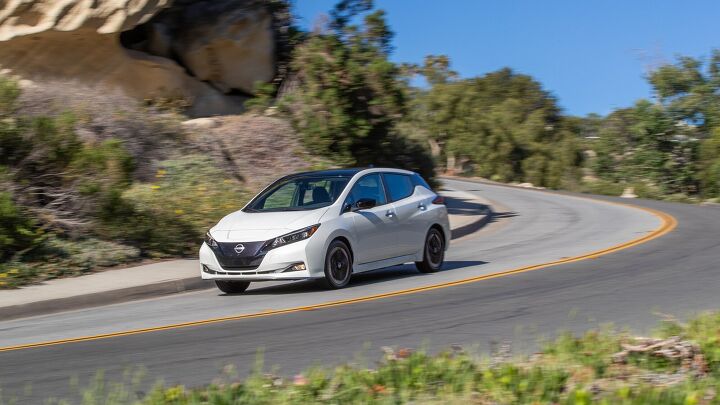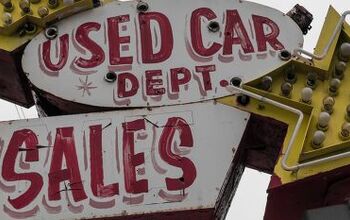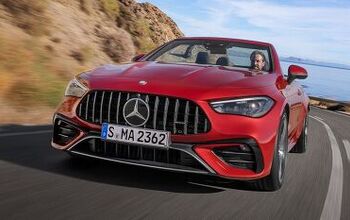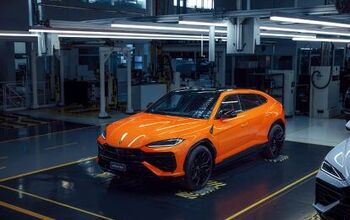The Nissan Leaf is Eligible for a $3,750 Tax Credit Again

The Nissan Leaf was already the most affordable EV on sale, but recent changes have made it even cheaper. The automaker announced that the car has regained eligibility for federal tax credits, though for only half of the maximum $7,500.
With the credit, the Leaf starts in the mid-$25,000 range, extending its lead as the cheapest EV on sale. It’s followed not-so-closely by the Mini Cooper SE, but regaining tax credit eligibility is a significant boost. The car qualified for tax credits through the end of last year, but automakers have to recertify vehicles under the new rules, and Nissan has only just done that for the Leaf.
Half of the EV tax credit is tied to raw materials sourcing, requiring that they come from a country with which the U.S. has a free-trade agreement. The Leaf doesn’t qualify for that half, but Nissan builds the car and its batteries at its plant in Smyrna, Tennessee, giving it access to the other $3,750. Changes to the rules in 2024 have knocked a significant number of vehicles out of eligibility, but many will return as automakers nail down their supply chains.
The Leaf has been around for a while without major changes, and its low price likely comes from its middling range numbers, which max out at 212 miles. That said, it’s a surprisingly practical car with plenty of interior space and a decent number of standard features for the price.
While it’s true that Americans don’t buy that many hatchbacks, it’s even truer that cars like the Nissan Leaf are precisely what we need. There’s no shortage of $50,000-plus EVs from all corners of the auto industry, but the sub-$30,000 (or even sub-$40,000) market is pathetically tiny. Anyone serious about electrification should celebrate cars like the Leaf and hope that Nissan keeps its ship upright going forward to keep building it, or a next-gen car like it.
[Image: Nissan]
Become a TTAC insider. Get the latest news, features, TTAC takes, and everything else that gets to the truth about cars first by subscribing to our newsletter.

Chris grew up in, under, and around cars, but took the long way around to becoming an automotive writer. After a career in technology consulting and a trip through business school, Chris began writing about the automotive industry as a way to reconnect with his passion and get behind the wheel of a new car every week. He focuses on taking complex industry stories and making them digestible by any reader. Just don’t expect him to stay away from high-mileage Porsches.
More by Chris Teague
Latest Car Reviews
Read moreLatest Product Reviews
Read moreRecent Comments
- Master Baiter I told my wife that rather than buying my 13YO son a car when he turns 16, we'd be better off just having him take Lyft everywhere he needs to go. She laughed off the idea, but between the cost of insurance and an extra vehicle, I'd wager that Lyft would be a cheaper option, and safer for the kid as well.
- Master Baiter Toyota and Honda have sufficient brand equity and manufacturing expertise that they could switch to producing EVs if and when they determine it's necessary based on market realities. If you know how to build cars, then designing one around an EV drive train is trivial for a company the size of Toyota or Honda. By waiting it out, these companies can take advantage of supply chains being developed around batteries and electric motors, while avoiding short term losses like Ford is experiencing. Regarding hybrids, personally I don't do enough city driving to warrant the expense and complexity of a system essentially designed to recover braking energy.
- Urlik You missed the point. The Feds haven’t changed child labor laws so it is still illegal under Federal law. No state has changed their law so that it goes against a Federal child labor hazardous order like working in a slaughter house either.
- Plaincraig 1975 Mercury Cougar with the 460 four barrel. My dad bought it new and removed all the pollution control stuff and did a lot of upgrades to the engine (450hp). I got to use it from 1986 to 1991 when I got my Eclipse GSX. The payments and insurance for a 3000GT were going to be too much. No tickets no accidents so far in my many years and miles.My sister learned on a 76 LTD with the 350 two barrel then a Ford Escort but she has tickets (speeding but she has contacts so they get dismissed or fine and no points) and accidents (none her fault)
- Namesakeone If I were the parent of a teenage daughter, I would want her in an H1 Hummer. It would be big enough to protect her in a crash, too big for her to afford the fuel (and thus keep her home), big enough to intimidate her in a parallel-parking situation (and thus keep her home), and the transmission tunnel would prevent backseat sex.If I were the parent of a teenage son, I would want him to have, for his first wheeled transportation...a ride-on lawnmower. For obvious reasons.


































Comments
Join the conversation
Make 62kwh battery standard. Improve the battery cooling/conditioning. Change charging to NACS.
Leaf will sell. It will.
There are Leaf enthusiasts now testing CHADEMO to CSS adapters now. See YouTube videos. The Leaf is a great one fast charge a day kind of car. Excellent if it is mostly being used locally and charged at home on L1 or L2.